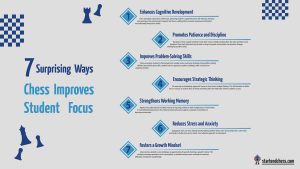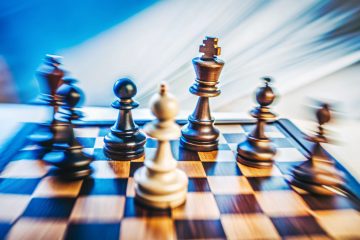7 Surprising Ways Chess Improves Student Focus and Concentration
In today’s fast-paced world, where distractions are everywhere, helping students improve their focus and concentration is more important than ever. One surprising and effective tool in this endeavor is chess.
While often seen as just a game, chess has proven to be a powerful educational tool that can significantly enhance a student’s ability to concentrate. This classic board game not only sharpens the mind but also builds essential skills that can benefit students in their academic and personal lives.
Chess improves student focus in ways that go beyond the chessboard. By engaging in this strategic game, students learn to think critically, plan ahead, and maintain their attention on complex tasks—skills that are crucial for academic success.
Whether it’s solving math problems, comprehending reading assignments, or tackling any other schoolwork, the mental discipline developed through chess can make all the difference in a student’s performance. In this article, we’ll explore seven surprising ways that chess can boost focus and concentration, revealing why it’s a game worth playing for every student.
- How does chess improve student focus?Chess improves student focus by engaging multiple cognitive processes simultaneously. It requires players to concentrate on the game, analyze positions, plan strategies, and anticipate the opponent's moves, all of which enhance attention span and mental discipline. Over time, this practice leads to improved focus and concentration in academic settings as well.
- How often should students play chess to improve focus?To see noticeable improvements in focus and concentration, students should play chess regularly, ideally several times a week. Consistent practice helps reinforce the cognitive and strategic skills developed during the game, leading to better focus both in and out of the classroom.
- Can chess help with other academic skills besides focus?Yes, chess helps improve various academic skills beyond focus. It enhances problem-solving abilities, promotes strategic thinking, strengthens working memory, and fosters a growth mindset. These skills are directly transferable to subjects like math, science, and reading, contributing to overall academic success.

-
Enhances Cognitive Development
Chess, per se, is a mental exercise. It is multifarious in nature because it provokes diverse cognitive functions simultaneously. During a game, students have to activate both halves of the brain, which their left hemispheres are responsible for logical reasoning, while the right hemisphere takes charge of creativity and pattern recognition. This double usage enhances one’s memory, analysis, and boosts the ability of the brain to handle complex information.
The minds of those students who frequently play chess are sharpened, and they can easily focus their attention on studying; they can absorb new knowledge more readily. In the long term, these cognitive improvements will help in all areas of academic improvement since now the students can grasp concepts that were previously difficult and retain them.
It is also known to be one of the integral factors for developing some of the important executive functions such as planning, organization, and impulse control. All these skills are very important in setting the milestones for students to achieve academic success. This is because they put them at a higher level of being able to manage time well, set priorities on tasks, and approach problems systematically.
With constant exercise of these cognitive muscles through chess, therefore, students develop a mental framework that underpins sustained concentration and better performance in all spheres of learning. In a nearly identical way, the mental discipline that one needs to excel at chess reflects the rigors of academic life, thus rendering it an enabler for cognitive development.
-
Promotes Patience and Discipline
Patience is the stepping stone to success in chess; one impulsive move and it could be defeat in no time. Students learn to slow down, look at the situation, evaluate choices, and then take action. This deliberate thinking will give rise to a sense of self-discipline that carries over beyond the chessboard. It hence translates into better study habits within the human resource confined in academic settings, whereby these students learn to treat work with the careful consideration used in chess. These students become methodical about their learning, taking their time to really get what is taught and not rushing to finish assignments.
Discipline in chess involves graceful handling of frustration and setbacks. The student comes to realize that each defeat is a chance to learn something new. This helps them not to get deterred by any problem that may be posed to them in their school work. Instead of getting frustrated over a math problem they are unable to solve or a low score on a test, they tackle such situations with the same level of patience and perseverance that they have developed through chess. If they can learn this skill of remaining focused despite the odds, this shall be a very important life skill in the students’ surmounting their problems toward success in accomplishing their academic objectives.
-
Improves Problem-Solving Skills
Many people consider chess as the battleground of wits: every move is really just a step in some strategic idea. In each game, different problems come up that need to be solved by the students.
Sometimes, it is to protect himself against possible attack or else, it is to design a winning strategy. This constant need to solve problems sharpens their analyzing ability in looking at situations, weighing choices, and making decisions—the very things most applicable to schoolwork. Whether it is solving complex math problems, writing essays, or conducting scientific experiments, that is exactly what gives the skills acquired in chess the headway to help students approach their studies with confidence and precision.
Moreover, it provides lessons in critical and creative thinking. Many solutions to different problems in a game of chess often exist, leaving the student to reflect on the possibilities of the outcome of making each move. This leads to flexible thinking, where a student accurately adjusts his or her approach to tackling a challenge. The adaptability is transferred into the academic environment, whereby students are often required to think offhand and come up with creative solutions to tough problems. Through chess, a student develops the mental ability that is needed to act with agility and excellence within his or her studies.

-
Encourages Strategic Thinking
Chess is a game for strategic minds in that at any point in time, a player has to think of his opponent and some moves ahead of their intentions. So, a student has got to focus his mind intensely on long-term goals yet adapt to changing dynamics in the game. Strategic thinking is ultimately characteristic of effective study skills and time management in academic work. Students will develop the skills to set clear goals, to break tasks down into manageable steps, and to remain focused on the set ultimate goal: be it acing an exam or completing a challenging project.
Chess also helps learners understand that patience and timing are important in the execution of a strategy. A major lesson learned is that success, most of the time, lies in waiting for the right moment to make any move, be it in chess or academics. Understanding this value of strategic planning and timing will make them more organized and proactive in their studies. Thus, they are better able to anticipate challenges and thus develop contingency plans; through chess, they remain focused on how they can attain their academic goals. Chess enables strategic thinking, hence giving an edge to learners in academics and their personal lives.
-
Strengthens Working Memory
One of the important cognitive functions that working memory enables is the ability of students to hold information in their minds and manipulate it over short periods of time. Through chess, one continually remembers the position of diverse pieces, follows the moves of opponents, and sees many moves ahead.
Working memory is constantly exercised in a way that enhances the ability of students to focus their attention on complex tasks that require the simultaneous processing of several pieces of information. High working-memory performance will help a student get through multiple-step math problems in academic settings, follow instructions during science experiments, remember information while reading, and so forth.
Furthermore, the mental discipline that is needed to keep several pieces of information within working memory in a chess game enables one to concentrate better during class. Students who play chess regularly develop better focus on their work amidst distractions or other competitive demands for attention.
Due to this enhanced concentration and retention potential, students can perform better in exams, complete their homework more satisfactorily, and finally achieve more academically. Improvement of working memory working within chess goes beyond the game to supply students with the mental tools necessary for success in school.

-
Reduces Stress and Anxiety
Regarding chess, it provides a different and unique way of mental immersion that allows students to step back from the pressures of daily life momentarily. While in a chess game, the student’s brain is fully engaged with the game and only focused on his mind on the board and the moves.
This kind of deep concentration acts like a type of mindfulness that mitigates stress and anxiety by keeping the mind on the present. It can thus be said that a soothing effect is brought upon the minds of students through regular participation in chess playing, which may further help boost their mental well-being and relatively relax them toward their approaches to studies.
Furthermore, chess helps to make the students resilient toward challenges. Students can face a situation with a free mind and a clean head, rather than being slowed down unnecessarily by stress. Maintaining a cool and composed state under stress is certainly an attribute that is of great use to any student at school and in life itself. Through chess, students decrease their stress and anxiety, due to which their concentration towards studies increases and makes them bold over difficult tasks. It even helps them to be positive amidst odd situations.
-
Fosters a Growth Mindset
This is one activity—chess—that just fosters the growth mindset in students, where they will view challenges and setbacks as opportunities for growth, not failures. The lessons learned in both cases of either winning or losing a game are really useful for future matches.
Making these mistakes and learning iteratively helps students accept their mistake as part and parcel of the learning process. Having practiced more on developing that mindset, the students can now carry the same maturity and mindset to be focused, persistent, and even motivated when the going gets tough.
The growth mindset engendered by chess encourages students to set high, positive expectations for themselves and to continuously be working for the better. They learn that success in chess, as in life itself, is achieved through practice, perseverance, and the willingness to learn from each experience.
Such a mental approach in learning keeps students consistently adhering to their goals and objectives, even under trying subjects or demanding tasks. By growing a mindset within the students through chess, they do not just become good at playing chess; some of them become gritty, resilient, determined, and focused people, ready to grapple with school and life’s difficulties.
Discover more by visiting our full collection of articles here

Conclusion
Chess is not just a game; it’s a living, breathing classroom—one that shapes young minds sharp and forever instills abilities. Every movement across the chessboard spells out lessons in patience, strategic thinking, and problem-solving, skills whose direct application will yield an improved academic performance. This game also teaches focus, critical thinking, and embracing challenges—something so very important to be had at school and in life.
Integrating chess regularly into the routine of a student will unlock one of the world’s most powerful tools for personal growth. It is beyond the board because it creates a mindset that demands resilience, concentration, and a love for learning. Chess doesn’t create players; it creates better thinkers, with sharper minds and more focus, able to take on the world.
We’ve prepared a podcast to accompany this article, offering the same insights in an audio format. If you enjoy listening, give it a play:
References:
- Sala, P., Gobet, F., Trinchero, R., & Ventura, M. (2017). “The Effect of Chess Instruction on Students’ Math Problem Solving.” International Journal of Educational Research, 84, 1-10. DOI: 10.1016/j.ijer.2017.06.004.
- Burgoyne, A. P., et al. (2016). “The relationship between chess skill and cognitive ability: A meta-analysis.” Intelligence, 59, 131-140. DOI: 10.1016/j.intell.2016.09.007.
- Tuck, D. (2018). “Teaching Kids to Play Chess: A Review of the Literature on the Benefits of Chess in Education.” Educational Research Review, 25, 125-140. DOI: 10.1016/j.edurev.2018.06.002.
- Lee, J. (2018). “Cognitive Benefits of Playing Chess: A Review of the Literature.” Journal of Cognitive Enhancement, 2(3), 314-327. DOI: 10.1007/s41465-018-0082-2.
- Bavelas, J. B. (2020). “Chess and the Brain: How Chess Improves Cognitive Function.” Psychology of Sport and Exercise, 45, 101-112. DOI: 10.1016/j.psychsport.2019.101134.
- Campitelli, G., & Gobet, F. (2010). “The role of practice in chess: A cognitive perspective.” Psychological Bulletin, 136(2), 163-179. DOI: 10.1037/a0017991.
- Horgan, D. D., & Morgan, C. (2020). “The impact of chess on academic performance: A systematic review.” Educational Psychology, 40(6), 726-746. DOI: 10.1080/01443410.2019.1619086.



0 Comments